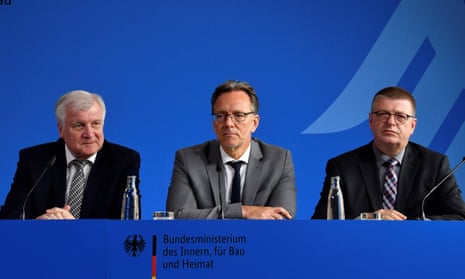Nearly 13,000 violent rightwing extremists are living in Germany, the chief of the country’s domestic intelligence service, which is investigating the murder of a pro-refugee politician, has revealed.
Thomas Haldenwang, head of the BfV, said the number was too great for security services to be able to monitor them all.
“We currently have 12,700 rightwing extremists willing to use violence in Germany, and it’s difficult to have an eye on them all,” he told a press conference at which the first concrete details about the main suspect in the murder of Walter Lübcke, a member of Angela Merkel’s Christian Democratic Union party, were released.
Referred to as Stephan E by investigators, but identified by anti-neo Nazi websites as a relatively well-known far-right figure named Stephan Ernst, the 45-year-old was typical of many rightwing extremists in Germany in that he had kept a low profile, Haldenwang said. For the security services, “people who for almost a decade have behaved inconspicuously are not considered a high priority”, he added.
Haldenwang said Ernst remained a suspect in Lübcke’s killing on 2 June, when he was shot outside his home in Kassel. The murder weapon has not been found.
DNA found on Lübcke’s clothing was matched with a DNA sample from Ernst held in a police data bank after he was convicted in 1993 of attempting to detonate a pipe bomb outside an asylum seeker’s shelter in the state of Hesse.
As more details emerged about the attack, which has shocked Germany not only because of its brutality but since suspicions were raised that Lübcke might have been murdered for his pro-refugee stance, the interior minister, Horst Seehofer, said investigators were trying to establish whether the attacker was a lone-wolf radical or operated as part of a neo-Nazi terror network.
Seehofer called the attack “a rightwing extremist assassination of a leading representative of the state”. He said it was “an alarm signal and is directed against all of us”.
Haldenwang said Ernst had started engaging in rightwing extremism in the 1980s: “Since this time he has been on the intelligence service’s radar. As a criminal he last came to our attention in 2009. But I can’t exclude whether he might have been conspicuous elsewhere.”
The head of Germany’s criminal police department, Holger Münch, told the press conference Ernst was a member of a shooting club but did not possess a weapons permit. He is being held in police custody in Hesse, but has so far refused to talk.
Ernst is understood to have ties to the militant Combat 18 group, though it remains unclear whether he is a formal member of the international neo-Nazi network, which has a tiered paid membership structure.
Combat 18, which was founded as a violent arm of Britain’s BNP in 1992 but has morphed into a network of autonomous neo-Nazi cells across Europe, has an estimated 50 formal members in Germany.
According to the German tabloid Bild, Ernst has in the past claimed to be a member of the “Oidoxie Streetfighting Crew”, a neo-Nazi group that some have described as a precursor to the current “Combat 18” cell.
Authorities emphasised at the press conference on Tuesday that Ernst had dropped off their radar about 10 years ago. The suspect’s name was, however, mentioned in front of the state parliament of Hesse as recently as 2016, when it was raised in a question by the leftwing Die Linke party.
In front of a fact-finding committee investigating the activity of the neo-Nazi terror group National Socialist Underground, a police informant had named Ernst as an example of a neo-Nazi in Kassel with violent tendencies.
According to the newspaper Süddeutsche Zeitung, Ernst had also left a threatening comment underneath a YouTube video in 2018. Using the pseudonym “Game Over”, he wrote: “Either this government abdicates soon or there will be deaths.”
More detail has emerged about Ernst’s previous convictions. In 1992 he tried to kill a man at a public toilet at Wiesbaden’s central station who had made “sexual advances”, as he claimed in front of a regional court. The victim of the attack, whom the court described as “visibly foreign”, was stabbed once in the back and once in the front, but survived after several emergency operations.
In June 1994, Ernst received a six-year prison sentence for planning the failed pipe-bomb attack on an asylum seekers’ shelter in Hohenstein-Steckenroth in Hesse During pre-trial custody, he also beat up a non-German prisoner with an iron chair leg, according to a report by the newspaper Die Zeit.
